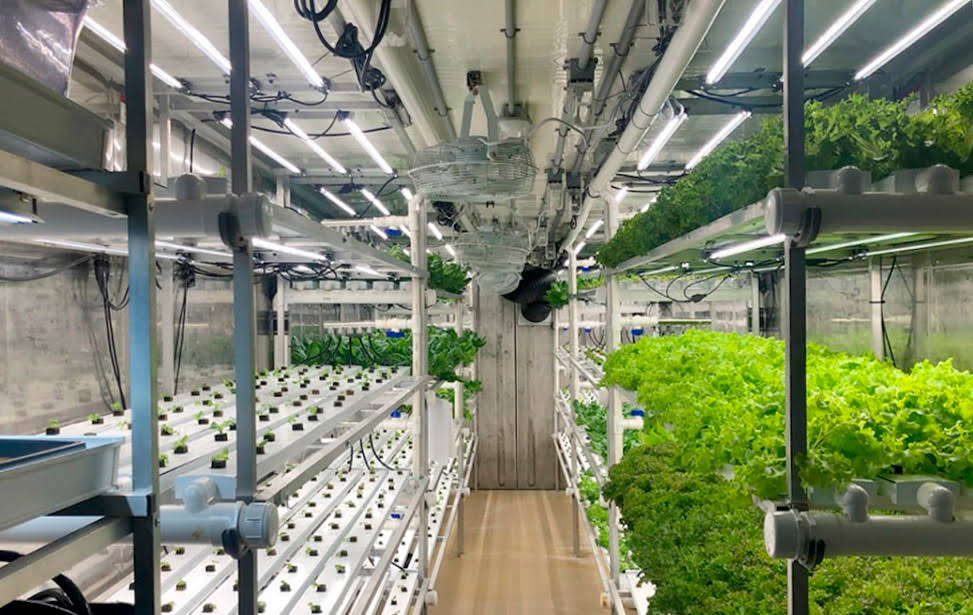- English

In the dynamic landscape of urban farming, Artificial Intelligence (AI) is emerging as a game-changer, particularly in vertical and hydroponic farming. As urban areas grapple with challenges in traditional agriculture, a transformative revolution is underway. Vertical farming, coupled with AI, is reshaping urban food cultivation, ushering in a new era of efficient and sustainable food production.
The Vertical Farming Revolution
In densely populated urban regions, conventional farming faces numerous hurdles such as land scarcity, soaring real estate prices, pollution, and unfavorable climates. Enter vertical farming—a contemporary solution to age-old problems. Vertical farming involves cultivating crops in stacked layers or inclined surfaces, capitalizing on limited urban space. This modern approach converts even modest urban spaces into potential hubs for food production.
Vertical farming brings more than space efficiency to the table. It enables year-round crop cultivation, independent of external weather conditions. By creating controlled environments, it reduces reliance on pesticides and grants precise control over water, light, and nutrient management. However, the true potential of vertical farming lies in its integration with AI technology. Let’s delve into the transformative role AI plays in enhancing vertical farming.
AI’s Role in High-Density Crop Production
AI holds a pivotal role in high-density crop production, particularly in vertical farming. Its transformative influence lies in optimizing crop growth, leading to healthier and more abundant yields. AI technology regulates crucial growth factors—light intensity, temperature, humidity, and nutrient delivery—ensuring each plant receives precise resources at the right moments.
Machine learning, a subset of AI, empowers systems like the GrowDirector 3 PRO to continually learn and adapt. These systems analyze growth conditions, interpret plant responses, and fine-tune the environment to maximize plant growth. Over time, they refine algorithms based on data insights, making decisions that foster healthy crops and high yields.
An outstanding benefit of AI in vertical farming is its ability to reduce human errors and resource wastage. By automating critical processes and relying on data-driven decisions, AI-driven systems avert overwatering, nutrient imbalances, and other common human-induced issues. The result? Healthier crops, elevated yields, and more sustainable agricultural practices.
The GrowDirector 3 PRO System
At the heart of the technological revolution in urban vertical farming stands the GrowDirector 3 PRO automation system. Tailored to automate and optimize high-density crop production in hydroponic farming setups, this system offers comprehensive solutions to growers’ challenges.
Growers can customize the system to their unique requirements and expand it as operations grow.
The system’s modularity and scalability encompass six tailored modules:
• HydroDirector: Equipped with pumps and sensors for nutrient and pH regulation.
• SensorDirector: Real-time data collection from multiple sensors.
• SocketDirector: Rule-based control of electrical equipment.
• DryContactDirector: Management of electrical devices.
• DimmerDirector: Customizable LED control for light schedules.
• ServerDirector: Local virtual cloud for offline access and secure management.
This system’s power arises from AI integration. By analyzing real-time data from the growing environment, GrowDirector 3 PRO’s AI algorithms make precise decisions on resource allocation, lighting conditions, and essential factors. This ensures optimal growth conditions, translating to higher yields and healthier crops.
Complementing the system is a user-friendly mobile app enabling remote monitoring and control. Growers gain insights into their crops’ status, adjust settings remotely, and receive prompt alerts about concerns. This empowers growers to manage operations efficiently, regardless of size or complexity.
Discover more about GrowDirector 3 PRO in official website – https://growdirector.com/
Achieving Sustainable Urban Agriculture
AI-driven vertical farming is a stride towards sustainable urban agriculture. This innovative method—stacked crop cultivation within controlled environments—drastically reduces water consumption. Vertical farming’s water usage can be up to 95% lower compared to traditional methods, achieved through closed-loop irrigation and moisture recycling.
Furthermore, vertical farming can slash the carbon footprint linked to food production. By bringing farms into urban areas, the distance food travels from farm to plate is shortened, reducing CO2 emissions. AI-driven vertical farming also fosters local food systems, guaranteeing year-round fresh produce despite external climate variations. This resilience aids urban areas facing climate change uncertainties.
Vertical farming’s high-density nature generates significantly more food per square foot than traditional methods. This efficiency optimizes urban space usage, contributing to resource conservation.
Real-world Implementations
AeroFarms, based in New Jersey, leverages AI for optimized plant growth. Precision control over environmental factors results in 390 times greater productivity per square foot than traditional methods. Bowery Farming in New York automates irrigation and lighting through AI systems, utilizing 95% less water and producing 100 times more efficiently.
GrowDirector Real Case Studie: Urban Hydroponic Farms Thriving with AI
Vertical Lettuce Farm in the US:
An urban vertical lettuce farm integrated the GrowDirector 3 PRO to optimize indoor growth. The farm installed four DryContactDirectors, two HydroDirectors, and two SensorDirectors to manage every process and control water usage, which is important for urban indoor farms.
The main challenge was to ensure the ideal conditions for indoor growth, maintain superior water quality in the hydroponic system, and closely monitor the microclimate in the area.
Overcoming Challenges and Future Prospects
While AI in vertical farming bears substantial benefits, challenges exist. Initial investment costs and the need for technical expertise can be barriers. Nevertheless, ongoing technological advancements and research in AI for urban farming hint at promising developments.
Conclusion
AI-driven vertical farming holds the potential to revolutionize urban agriculture. Through AI integration, hydroponic farming gains efficiency and reduces resource wastage. AI-powered systems like GrowDirector 3 PRO showcase scalability, adaptability, and the transformation of food production’s future. Despite challenges, ongoing technological progress suggests a promising path to building sustainable, resilient, and food-secure urban systems.
PS
Why don’t plants use traditional computers?
Because they prefer to go with “vine”-telligence!